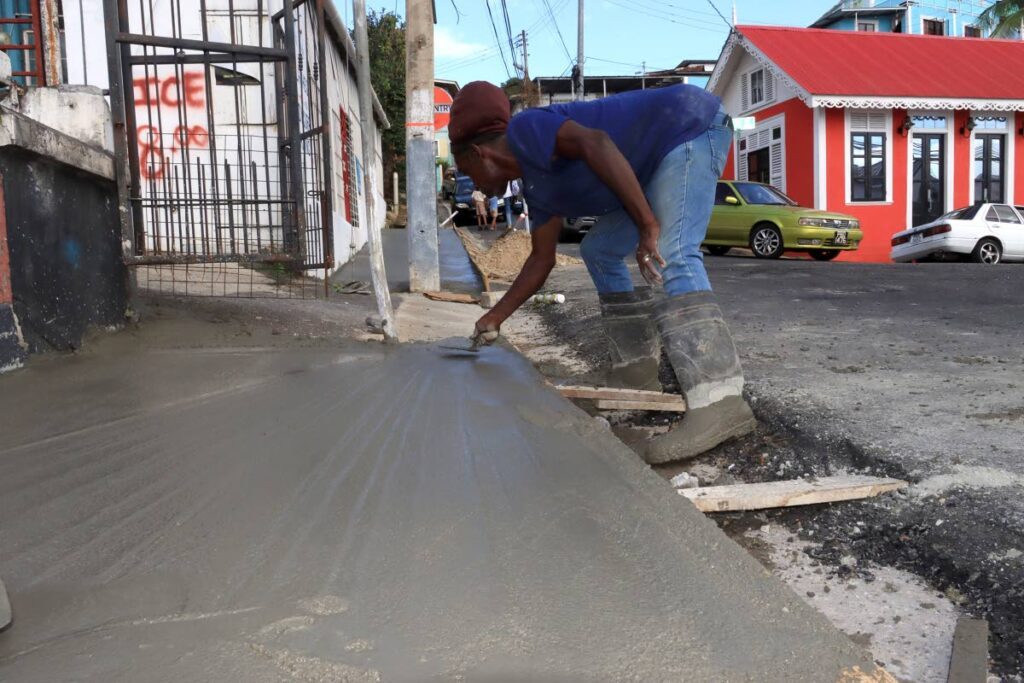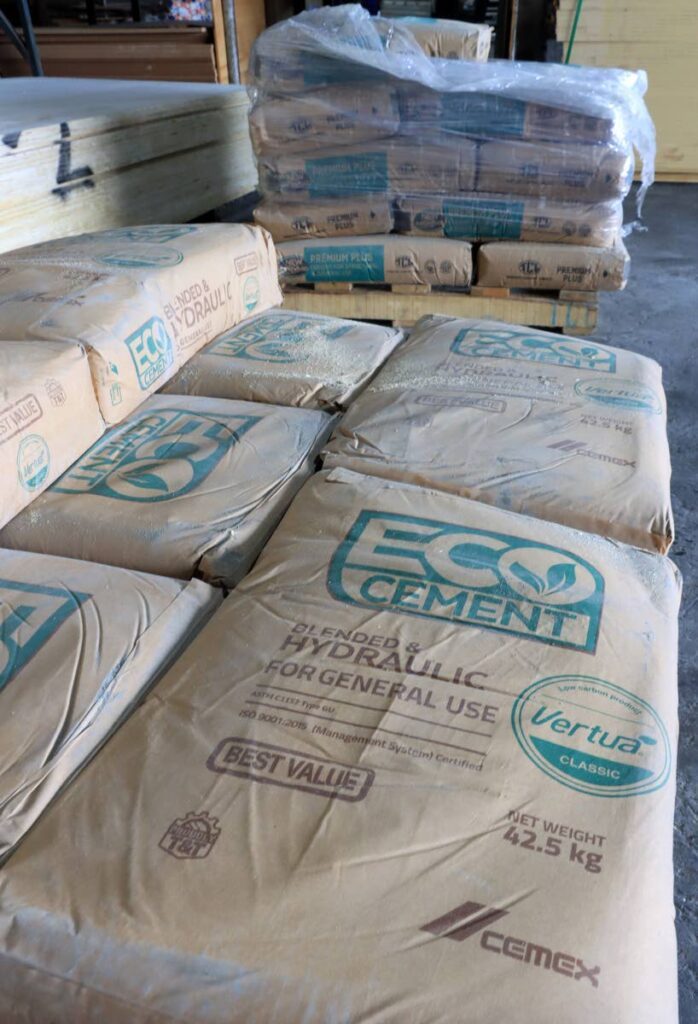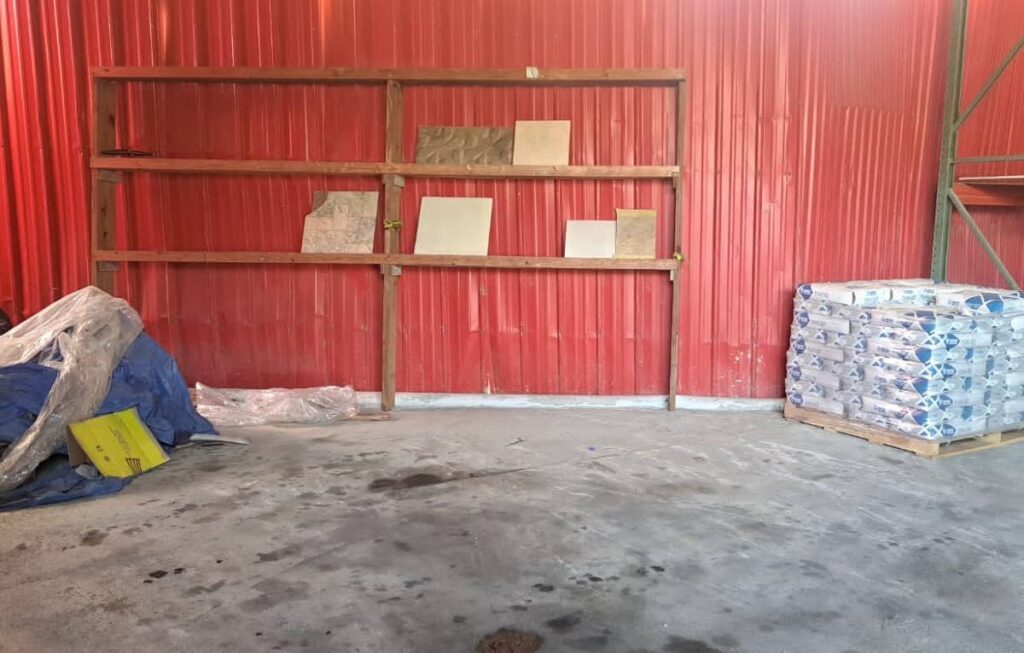Hardware owners, customers, contractors: 'Break the cement monopoly'

As the public is being asked to pay more for cement for the fourth time in just over two years, there are calls for Trinidad Cement Ltd's (TCL) monopoly to be broken.
The first increase came in December 2021, and hikes have followed each year since, resulting in a cumulative jump of over 30 per cent.
Labouring to cast a vehicle ramp in the midday sun at a small property on Harris Street, San Fernando, on Monday is Shammie Ramdass, 55. He is cementing in place a 12-foot length of pipe in a drain, while Bickram Ramnanan, 78, sits on his pickup tray supervising the project.
Lying next to the wet concrete in the road are two bags of 42.5 kg TCL premium plus cement. It was taken on credit from a hardware in Esperance earlier that morning for a price Ramnanan can't quite recall.
However, he knows had he acted a few days earlier, it would have been cheaper, as that same day (February 19) the cost from the factory went up by 6.63 per cent. TCL cited increased costs as the reason for this recent hike.
"Them just have a monopoly and they're just doing what they want to do.
"And it's not fair to the construction business, because you use a lot of cement in construction. As a single-unit item, you're using a tremendous amount of cement. So if you put a price that high in cement alone, that is a real negative impact on a man's ability to complete his construction," he said.
The two are among many who believe Rock Hard Cement, imported from Turkiye, was the superior and cost-effective product on the market until the company ceased operations in 2021, saying there were challenges from the government and discriminatory policies.
Ramdass, a small contractor for over 30 years, said while he and other similar-scaled businesses will feel a pinch from the increase, it's the larger contractors and ultimately customers who will take a bigger blow to their pockets from the increase.
Ramnanan believes TCL would have been more hesitant to increase its prices if Rock Hard were still on the market.
TCL announced earlier this month that prices of eco cement and premium cement would increase by 6.63 and 7.69 per cent, respectively.

The ex-factory price of a 42.5 kg sack of eco cement – the price before it is taken from the factory to the hardware stores – will go up from $49.10 to $52.88 VAT inclusive, while prices for premium plus cement will increase from $53.81 to $57.38.
Dansteel, Marabella manager Jimmy Cumming shared this view, saying he believes customers would prefer to have a choice in what product they buy.
"Once there is competition, you will see that then people have a choice. But right now, there is no choice. So they have to (buy the TCL cement)," he said.
CEO of Built to Last Roofing and Hardware in Freeport Terrence Kalloo believes Rock Hard was a perfect competitor to TCL, as its presence and penetration in the local market acted as a check and balance for TCL, keeping prices down.
The first hike of 15.6 per cent came less than three months after Rock Hard's departure in December 2021, followed by seven per cent in August 2022 and five per cent in March 2023.
"Other building materials, for instance, blocks and steel, have not gone up by that amount (34 per cent). As a matter of fact, if you check it, steel two years ago went down in price," he said. "When Rock Hard was here, they brought cement from Turkiye, and their prices were better than TCL, (which is) producing here, and we had to pay duty on that (Rock Hard Cement).
"What TCL uses? They use all the aggregate from Trinidad."
While he said the increase will be multiplied for larger construction projects, commercial construction, like housing developments, will not bear the burden, as the cost will be passed on to customers.
Between 2021 and 2024, one tonne of 1/2 inch and 5/8 steel went down from $9,219.37 VAT inclusive to $6,238.12. That's a decrease of $2,981.25, or 32 per cent. Concrete blocks increased between 2021 and 2024 from $5.79 to $6.79 for a six-inch unit and from $4.78 to $5.33 for a four-inch unit. Those are increases of 17.2 per cent and 11.5 per cent respectively.
To mitigate the burden of the price increase, the Ministry of Trade and Industry waived the 150,000-tonne importation quota, but kept the 20 per cent Common External Tariff (CET).
However, Kalloo told Business Day that a tariff that high makes it impractical for hardware stores to import cement.
In the release announcing the waiver of the quota, the ministry said it would meet with TCL soon, "and thereafter, recommend further policy adjustments inclusive of a review of the CET on cement, if necessary, in the national interest."
The price hike was announced earlier this month and took effect on Monday.

However, hardware stores reported a change in customers' buying habits leading up to the hike, mainly those buying cement in large quantities.
The owner of Hardware Supplies in Duncan Village, San Fernando, said he sold 24 pallets of cement (35 bags), which is a marked increase from the ten pallets he typically sells.
Similarly, Sundar Bissessar, owner of SNS Hardware Ltd, said he saw increased sales from contractors who specialise in foundation work, which requires large amounts of cement.
On the other hand, a sales representative at D Seebalack Hardware in Penal, Adesh Rampersad, said they saw two contractors cancel their orders of two pallets of cement each because of losses they would have incurred owing their quotations being issued under the old prices.
Rampersad said the pallet sold for $1,890 before the increase, but now sells for $2,065.
Earlier this month, TCL said the hike was unavoidable, citing the escalating cost of natural gas, raw materials, spare parts, "and other essential inputs, which have risen significantly in the past year."
Business Day contacted TCL for further comment on the price increase, but a response was not forthcoming.
The company did not respond to questions which included: whether customers could expect a price drop if costs decreased; if it is working to bring down costs with government agencies; if there were similar price hikes in the seven other Caribbean markets it operates in and how it feels about sentiments expressed by the public toward the company.
A representative of the company told Business Day on Tuesday evening that it would not be responding to the e-mail, believing the initial release was sufficient.
Business Day was also unable to get comments from the Trade Ministry on questions which include whether the ministry has met with TCL, as promised in its release two weeks ago.
Despite numerous attempts, Business Day was also unable to secure comments from Trade and Industry Minister Paula Gopee-Scoon, who only said in a WhatsApp message, "These are matters to be discussed at Cabinet first."
Port of Spain hardware owners: 'Importing cement too difficult'
Despite a waiver on the quota required to import cement, hardware stores and contractors are shying away from the opportunity, saying that it would be too difficult for any one company to bring in.
Business Day spoke to hardware store owners and contractors in Port of Spain and environs on Tuesday, as cement company TCL imposed its fourth increase in cement prices.
While some hardware stores were maintaining their prices for the moment, others implemented the price increase immediately, saying they had no other choice.

“We really can’t do anything,” said Saeida Mohammed, co-owner of H&S Mohammed Hardware in Cocorite.
Speaking on the possibility of importing cement she said: “I don’t think there is a unified body of hardware stores that can do anything to import cement, and it would be too difficult for any hardware to bring in alone.”
She said it was still too early to get feedback from customers, but she was sure there would be complaints.
“We know it will cause noise in the house,” she said. “But all we can say is we can’t be blamed. There is nothing that we can do.”
Mohammed said on Monday her retail price increased to $69.25 VAT inclusive for premium cement and $65 for eco-cement.
A manager at Johnny Q Hardware on Ariapita Avenue, who did not want to be named, said prices had not increased for them yet, with their cement bags costing around $60 a bag and $30 for damaged bags.
“We still have about a pallet in stock,” the manager said. “When that clears there may or may not be a price increase. We will just have to wait and see.”
Contractors Association president Glenn Mahabirsingh said companies will have to assess whether they can or cannot take advantage of the waiver.
“It really depends on their business model and the market research,” he said. “People would need to research supply chains. They would have to understand the logistics of receiving, handling and distributing cement.”
He added that companies would also have to ensure that they import cement that is in line with the Bureau of Standards’ requirements and standards for the sale of cement.
All this while considering the marketing and sale of the cement as it is a perishable product and cannot stay shelved for long.
According to the online data platform the Observatory of Economic Complexity (OEC), TT imported $1.76 million in cement articles, making it the 137th largest importer of cement in the world.
TT’s imports came from China, India and Turkiye.
No cement in Tobago
Tobagonians are yet to feel the increase in cement prices as there is no cement on the island.
Business Day visited several hardwares across the island on Friday and again on Tuesday.
While most hardware owners declined to comment, the owner of D#1 hardware, Demi John Cruickshank, said the island was unable to implement the increases as there is currently no cement on the island.
Cruickshank said this is as a result of the unavailability of the Cabo star.

“The Cabo Star has been up and down with the cruise ship arrangement – as long as there is a cruise ship in Trinidad, the Cabo Star cannot sail. It actually has to park up in Tobago and wait. We go down tonight (Tuesday) and load tomorrow (Wednesday) for the return with the trucks.”
He added: “I hope by the end of this week, we see the warehouses in Tobago fully stocked.”
On the increases, he said TCL has increased by $5 to $8 on cement so it would be passed on to the customers.
“From the Tobago end, you would see a $8 on the island.”
He went further outlining the positives.
“The good thing about this is that the government said that as long as TCL increases cement prices, they would remove the tariff so we can see very soon a reemergence of other brands back on the market which would give TCL some competition and at least we would see the price of cement coming down.”
But then there are the negatives, he said.
“On one hand what it did it would push up the prices of concrete blocks as the blocks prices also went up by approximately $100 per pallet and we saw other commodities will go up around it – steel everything will go up. Once cement goes up, everything goes up. So we will see some price increase.”
Questioned further on imports, he said: “We in Tobago, we’re a very small market. For Tobago’s hardwares to import is mostly unlikely because we are very, very small – we’re just ten per cent of the market overall in TT.”
Ryan Hamilton-Davis and Kinnesha George-Harry contributed to this article.


Comments
"Hardware owners, customers, contractors: ‘Break the cement monopoly’"